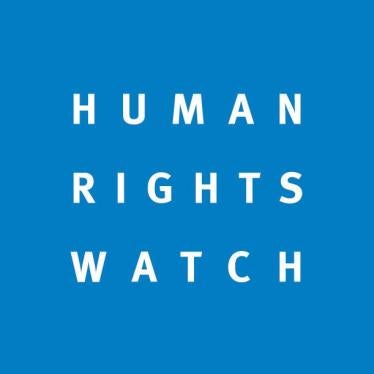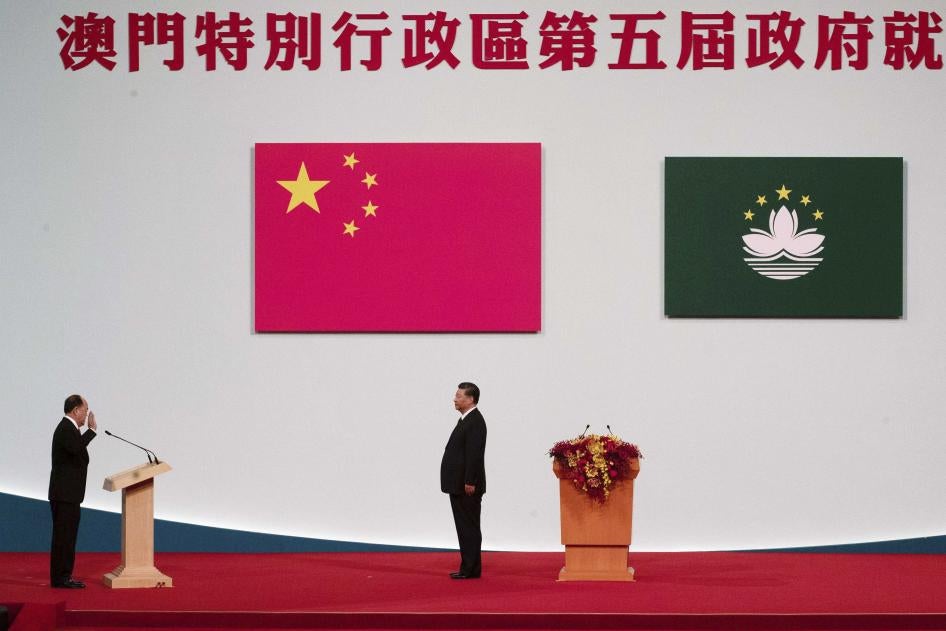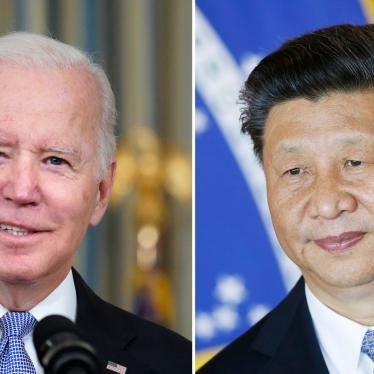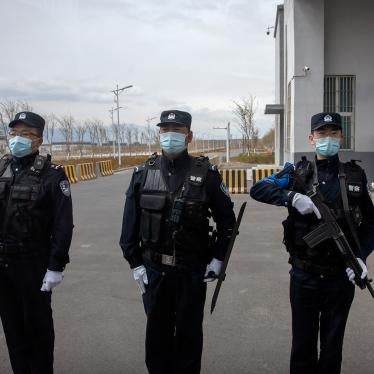(New York) – The Chinese Communist Party does not usually air its dirty laundry in public. So it was an ominous sign last month when official Chinese media reported startling allegations against a disgraced senior police official: Sun Lijun, a former vice minister of public security who has been detained for more than a year over a vague party disciplinary violation, had formed a “political clique” that must be “purged” from China’s political system, CCP investigators claimed. The wording of the accusation suggested that more officials—perhaps at even higher levels of government—could yet be ensnared in the alleged conspiracy.
Just days before the allegations against Sun appeared in the press, a former justice minister, Fu Zhenghua, was also taken into custody. It is unclear if Fu and Sun are part of the same “clique,” but they are not alone. Since February, the CCP has acknowledged disciplining more than 170,000 officials and secretly detaining nearly 3,000 of them as part of a campaign to “rectify” China’s law enforcement and judiciary. Those who serve the country’s politicized legal system, it seems, are being abused as they have abused others.
The campaign of rectification is the latest in a series of nationwide crackdowns initiated by Chinese President Xi Jinping. In 2012, Xi began an anticorruption drive, and in 2018 he launched a campaign against vice, including drug dealing, gambling, and other gang-related crimes. Both crackdowns sought to cleanse China’s often-corrupt bureaucracy and shore up Xi’s legitimacy, eliminating his rivals and suppressing dissent. Chinese authorities have claimed that the current campaign targets corrupt elements within the law enforcement and judicial systems, including officials who took bribes to release well-connected criminals on medical parole. In practice, however, this campaign also aims to twist the law into a tool for Xi’s own power.
The Sharp Knife Turns Inward
Central to Xi’s campaign of rectification is a secretive system of detention. For years, this system was known as shuanggui, which means to appear in a “designated place at a designated time,” and it was run by the CCP’s Central Commission for Discipline Inspection. According to a 2016 Human Rights Watch investigation, which involved interviews with victims and their families as well as court records and other official documents, those subjected to shuanggui were detained in secret locations for months at a time without access to lawyers or family members. They faced physical and psychological abuse, including beatings, solitary confinement, prolonged sleep deprivation, exposure to extreme temperatures, lack of food and water, and threats to their families. By law, China prohibits the use of evidence directly obtained through torture. But in practice, judges rarely throw out such unlawful evidence, especially if it was obtained through shuanggui. Human Rights Watch found no cases in which the courts had acquitted suspects due to misconduct by investigators during shuanggui.
In 2018, the Chinese government replaced shuanggui with liuzhi, which can be translated to “stay and placement,” and created a new antigraft “super agency,” the National Supervision Commission, to oversee it. Liuzhi follows stricter procedures than its predecessor, including time limits on detention, but unlike shuanggui, the new system targets a wide range of people, not just party officials. Anyone deemed to wield public authority can be subjected to liuzhi, including public school teachers. By regulating and institutionalizing shuanggui, in other words, the CCP has transformed an internal party detention system that existed outside the law into one that empowers and entrenches the party’s authority over the law.
Over the last three years, reports of abuse under liuzhi have emerged. In May 2018, the driver of a CCP official died during liuzhi in Fujian Province. His “face was distorted, his chest collapsed,” according to a family member who viewed his body and gave an interview to the Chinese newspaper Caixin. In a separate case, another official, Yang Meng, testified in court that liuzhi interrogators held him in a “tiger chair”—used to immobilize suspects during interrogations—for 18 hours every day for five months, rubbed stinging oil into his eyes, and shined bright lights at him around the clock. Yang now suffers from hearing loss, poor eyesight, and other physical impairments. But the court that heard his case, in September 2020, has so far refused to order a medical examination to evaluate his injuries, allow his lawyers full access to the video of his interrogations, or throw out the evidence obtained through torture, according to his lawyers.
During the current campaign of rectification, liuzhi has been used as a weapon against elements of law enforcement and the judicial system itself. The CCP has turned its “sharp knife” inward, according to official propaganda, in order to scrape the “toxins off the bones.” The purpose is to instill a sense of fear and, through that, absolute loyalty and acquiescence to the demands of the party. The ironic result has been the persecution of officials such as Sun and Fu, who were implicated in previous crackdowns on human rights lawyers, civil society, and other perceived enemies of the CCP. One of their victims was Wang Quanzhang, a human rights lawyer who was detained and tortured for three years before being convicted in 2019 of the trumped-up crime of “subverting state power.” The previous year, a foreign journalist asked Fu, who was then the justice minister, about the reason for Wang’s long disappearance. Fu responded that “China is a country with the rule of law. A person’s freedom and their rights are all being treated in accordance with the law.” Given that China’s criminal conviction rate is over 99.9 percent, one wonders if Fu would say the same thing now.
Rule by Law
The CCP has compared its current campaign of rectification to one that Mao Zedong carried out more than 80 years ago. In the name of “rescuing” those who had erred, including spies and Trotskyites, Mao stamped out his rivals in a brutal drive of intimidation and suppression between 1942 and 1945. The so-called Yan’an Rectification Campaign made widespread use of torture, including beatings and mock executions; how many perished in this purge is unknown. Despite—or perhaps because of—the massive toll of human suffering, the campaign played a crucial role in establishing Mao’s cult of personality.
Xi’s campaign of rectification appears less bloodthirsty by comparison. But its insidiousness stems in part from the veneer of legality he has sought to give it: unlike Mao, who largely determined the course of the Yan’an Rectification Campaign himself, Xi has channeled his campaign through the institutions of the legal system, which has detained and punished officials according to purported rules and evidentiary standards. (Even the tiger chairs used in today’s liuzhi sessions are made on assembly lines by companies that claim to respect human rights.)
At its heart, however, Xi’s campaign is a sinister manipulation of the very concept of law. After Mao’s death, the Chinese government reconstructed its legal system partly in accordance with liberal political ideas, as the legal scholar Eva Pils has documented. Along with Deng Xiaoping’s economic and political reforms came a legal perspective in the tradition of Friedrich Hayek and John Rawls that cast law as a restraint on arbitrary power—an attractive proposition for those fresh from the traumas of the Mao era. This perspective was always in tension with the party’s authoritarianism, but it gained sway for a time in part because Chinese lawyers pressed the government to transform its promises of a liberal rule of law into reality.
Xi has reversed course; the most influential legal scholars in China are now antiliberal. Some have even been influenced by the Nazi philosopher Carl Schmitt, whose school of thought is “defensive of arbitrary uses of power,” according to Pils, and considers laws “justified by the existence of enemies of the political order.”
Xi’s crackdown on law enforcement and the judiciary is solidifying China’s turn away from liberal legal principles. In November, the Ministry of Public Security released a new version of the oath taken by all new police officers. Whereas recruits once had to swear to “be resolutely loyal to the Party,” they must now “resolutely support the absolute leadership of the Party” and also pledge to “defend political security.” Tellingly, the new oath omits the old requirement to “promote social fairness and justice.” The change, the ministry has explained, aims to ensure that the police force remains “ideologically, politically, and operationally . . . consisten[t] with” Xi. The paramount goal of law enforcement, in other words, is not the safety or security of the Chinese people but loyalty to the Chinese leader himself.
As Xi tightens his grip over China’s political system, he is sharpening his coercive instruments and ensuring that only he can wield them. Like previous campaigns against corruption and vice, Xi’s campaign to rectify law enforcement and the judiciary aims to bolster his authority and eliminate potential rivals. But it also aims to bend China’s entire legal system to his will and ensure that society, like Sun and Fu, must obey and submit.










